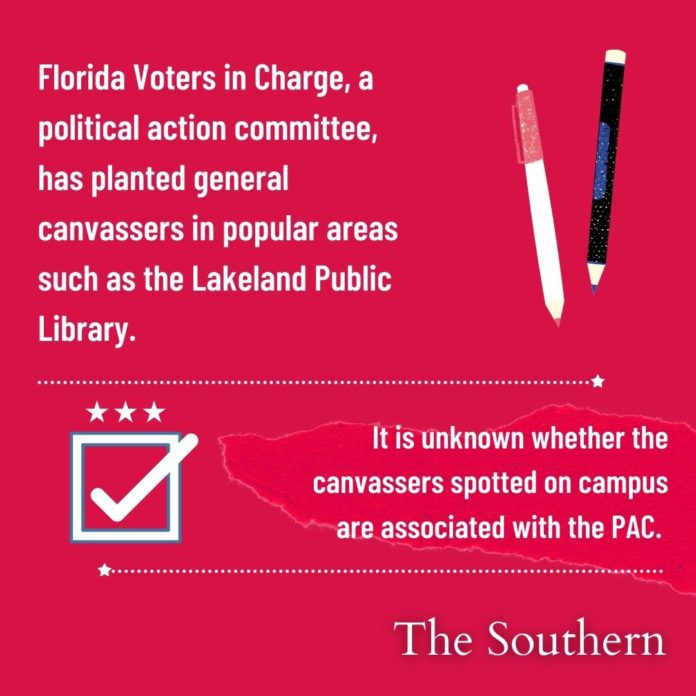
Salvatore Ambrosino
The past week, students going to class on Johnson Avenue have been approached by canvassers around Christoverson and the Buck Stop. More recently, they’ve even been seen going door-to-door at the Lake Hollingsworth Apartments.
While petitioning on public property is protected under state law and the First Amendment, Florida Southern College is a private entity, leading to the removal of the petitioners from campus by safety officers.
“We do not allow any polling on the internal parts of our campus,” said Eric Rauch, Director of Campus Safety, who confirmed that there has been an increase of removals from campus regarding canvassers. “We had a couple people coming into The Buck Stop—that’s a place for our students to have dinner, sit down and talk to each other, and not to be bothered by people coming from off campus.”
Petitioners have been spotted on the sidewalk around Lake Hollingsworth Drive; some of the strategies of the canvassers have made students uncomfortable.
Ruby Silver, a communications and psychology sophomore, says she was approached by a male canvasser at the Target on 98. She signed the petition.
“The next day there’s a knock on our door at LHA,” Silver said. “It’s the same man from Target. You can imagine I was scared because this random man who has my personal information just showed up at my school owned apartment.”
Silver says it seemed to be a coincidence because the petitioner appeared to be going door-to-door.
“Honestly it’s kind of uncomfortable to be approached with a petition where you live,” Silver said.
Although the petitioners’ affiliation on campus are yet unclear, Florida Voters in Charge, a non-partisan political action committee primarily funded by the Seminole Tribe of Florida, has planted general canvassers in popular areas such as the Lakeland Public Library.
The initiative sponsored by the PAC called “Amendment X, section 33” was described by one of the petitioners as a tax. Canvassers at the library promote the legislation by telling subscribers that they are helping to fund hospitals and schools.
The language in the initiative only describes a “minimum capital investment requirement,” with no mention of hospitals or education, only improvements to the “license holder’s gaming complex.”
But different initiatives reported by The Alligator are being canvassed in Gainesville and Orlando supporting the Seminole Compact, protecting profits of The Tribe, apparently in opposition to the petitioners in Lakeland.
With enough signatures sent to the state, these initiatives could be included on a list of legislation eligible to be passed during Florida’s 2022 gubernatorial election, according to Daisean Wilson, the supervisor of the petitions for Voters in Charge in Polk County. In Florida, a petition needs nearly 900,000 signatures to be considered for the ballot.
In August, Governor Ron DeSantis passed the Seminole Compact, the largest gaming compact in history, which is projected to yield a minimum of $2.5 billion in revenue for the state over the next five years—$6 billion through the year 2030. The compact also means the rollout of new casino games, translating to “more jobs for Floridians and more money invested in the state,” according to DeSantis.
Currently, the Seminole Tribe of Florida pays none of their revenue from casinos to the state.







